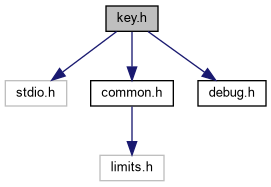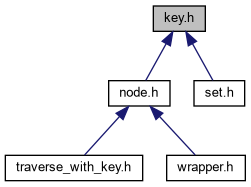|
Rabbit Tree
Radix bit tries for implementing associative arrays and sets in C.
|


Go to the source code of this file.
Macros | |
| #define | BITS_TO_PINS(x) DIV_UP(x, RBT_PIN_SIZE_BITS) |
| #define | BITS_TO_PINS_TO_BYTES(x) PINS_TO_BYTES(BITS_TO_PINS(x)) |
| #define | PINS_TO_BYTES(x) ((x) * RBT_PIN_SIZE) |
| #define | RBT_DIVMOD(a, b, c, d) |
| #define | RBT_PIN_SIZE sizeof(RBT_PIN_T) |
| #define | RBT_PIN_SIZE_BITS (RBT_PIN_SIZE * BITS_PER_BYTE) |
Functions | |
| RBT_KEY_SIZE_T | RBT_COMMON_BIT_PREFIX_LEN (RBT_PIN_T *a, RBT_PIN_T *b, RBT_KEY_SIZE_T max) |
| void | RBT_FPRINT_BITS (FILE *fd, RBT_PIN_T *key, RBT_KEY_SIZE_T n, RBT_KEY_SIZE_T skip) |
Detailed Description
- Copyright
- GPL2 only
Required Macro Definitions:
RBT_KEY_H_PREFIX_
The prefix for visible variable and function declarations in this header.
RBT_PIN_T
The type of array element used to hold the key bits interally. This is independent of the actual key type. It must be an unsigned integer type. Smaller types use space more efficiently but they are not always the fastest type. For example, GCC supports built-in functions (
__builtin_clz()etc.) for some larger integer types but not for 8-bit integer types. These functions can have a significant effect on tree traversal.Note that the pin type is independent of the key type and size.
RBT_KEY_SIZE_T
An unsigned integer type large enough to count the bits in all possible keys. Let
 be the (maximum) number of bytes in a key and let
be the (maximum) number of bytes in a key and let  be the number of bits per byte. The maximum number of bits in a key is then
be the number of bits per byte. The maximum number of bits in a key is then  . The key size type must be an unsigned integer type that can store this number.
. The key size type must be an unsigned integer type that can store this number.Let
 be the size in bytes of our key size type. The maximum value that this type can represent is
be the size in bytes of our key size type. The maximum value that this type can represent is  and thus the necessary condition is
and thus the necessary condition is 
The minimum required size in bytes of the key size type is therefore
![\[ s_\textup{min} \ge \frac {\log_{2}(n*b + 1)} b \]](form_6.png)
of, if you prefer thinking in bits,
![\[ S_\textup{min} \ge \log_{2}(N + 1) \]](form_7.png)
where
 is the size of the key size type in bits and
is the size of the key size type in bits and  is the maximum number of bits in the key.
is the maximum number of bits in the key.For fixed-width types,
 will be equal to the value returned by
will be equal to the value returned by sizeof. For variable width types, an upper limit will have to be anticipated.RBT_KEY_SIZE_T_FORMAT
The printf format parameter for RBT_KEY_SIZE_T, e.g. "u". When using integer formats from stdint.h, use the matching parameters from inttypes.h.
Examples
Fixed Width 128 Bit Keys
uint_fast32_t will make use of GCC's __builtin_clz(). The minimum required size of the key size type is 7.011..., so an 8-bit type will suffice.
#define RBT_PIN_T uint_fast32_t #define RBT_KEY_SIZE_T uint_fast8_t
Variable Width String Keys
Again, uint_fast_32_t is used for the reason given above. If string keys would not exceed 10 characters thenuing_fast8_twould suffice as the key size type, but 10 characters is very restrictive. By usinguint_fast32_t`, keys up to 100000000 characters can be used.
#define RBT_PIN_T uint_fast32_t #define RBT_KEY_SIZE_T uint_fast32_t
Macro Definition Documentation
◆ BITS_TO_PINS
| #define BITS_TO_PINS | ( | x | ) | DIV_UP(x, RBT_PIN_SIZE_BITS) |
Calculate the number of pins required to hold a given number of bits.
- Parameters
-
[in] x The number of bits.
◆ BITS_TO_PINS_TO_BYTES
| #define BITS_TO_PINS_TO_BYTES | ( | x | ) | PINS_TO_BYTES(BITS_TO_PINS(x)) |
Calculate the number of bytes required to hold a number of bits using an array of pins. This will differ from the number of bytes required to hold the bits directly if the number of bits is not an integral multiple of the pin size.
- Parameters
-
[in] x The number of bits.
◆ PINS_TO_BYTES
| #define PINS_TO_BYTES | ( | x | ) | ((x) * RBT_PIN_SIZE) |
Calculate the number of bytes required to hold a given number of pins.
- Parameters
-
[in] x The number of pins.
◆ RBT_DIVMOD
| #define RBT_DIVMOD | ( | a, | |
| b, | |||
| c, | |||
| d | |||
| ) |
Calculate the quotient and remainder of integer division. This should be optimized by the compiler to a single division operation.
- Parameters
-
[in] a The dividend. [in] b The divisor. [out] c The quotient. [out] d The remainder.
◆ RBT_PIN_SIZE
| #define RBT_PIN_SIZE sizeof(RBT_PIN_T) |
The number of bytes in the pin type.
◆ RBT_PIN_SIZE_BITS
| #define RBT_PIN_SIZE_BITS (RBT_PIN_SIZE * BITS_PER_BYTE) |
The number of bits in the pin type.
Function Documentation
◆ RBT_COMMON_BIT_PREFIX_LEN()
| RBT_KEY_SIZE_T RBT_COMMON_BIT_PREFIX_LEN | ( | RBT_PIN_T * | a, |
| RBT_PIN_T * | b, | ||
| RBT_KEY_SIZE_T | max | ||
| ) |
Determine the number of common bits at the beginning of two keys.
- Parameters
-
[in] a The first key. [in] b The second key. [in] max The maximum number of bits to check.
- Returns
- The number of common bits.
- Todo:
- Investigate ways to optimize this (e.g. asm).
◆ RBT_FPRINT_BITS()
| void RBT_FPRINT_BITS | ( | FILE * | fd, |
| RBT_PIN_T * | key, | ||
| RBT_KEY_SIZE_T | n, | ||
| RBT_KEY_SIZE_T | skip | ||
| ) |
Print a string representation of the bits in a key.
- Parameters
-
[in] fd The output file descriptor. [in] key The key to print. [in] n The number of bits to print. [in] skip The number of bits from the start to skip.
Generated on Fri Jul 15 2022 14:40:16 for Rabbit Tree by
 1.9.3
1.9.3
- Contact
- echo xyne.archlinux.org | sed 's/\./@/'
